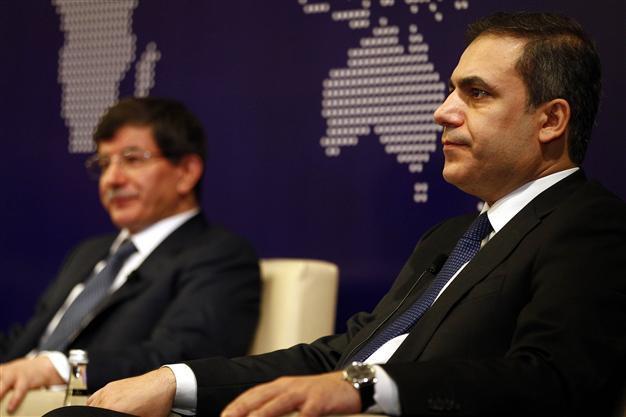Analysis: Newspaper stories hint at silent bureaucratic rift
ISTANBUL - Hürriyet Daily News

National Intelligence Agency (MİT) chief Hakan Fidan finds himself again in the center of a ‘power struggle.’
The reports that Turkey’s intelligence chief could be included in an investigation into negligence claims surrounding the downing of a Turkish jet by Syria have sparked another “proxy war” over stories in newspapers.Two newspapers in line with government policies yesterday published front page stories asking how and why National Intelligence Agency (MİT) chief Hakan Fidan’s name was involved in the probe, while two other dailies preferred to play down the story.
Semi-official Anatolia news agency reported Jan. 1 that Fidan was under a probe for his and the agency’s role in giving orders to Cpt. Gökhan Ertan and Lt. Hasan Hüseyin Aksoy, who were killed when their plane was shot down by Syria on June 22, 2012.
Yeni Şafak asked in its lead story yesterday, “Where does the MİT link come from?” In the story, the daily said Malatya Chief Prosecutor Muzaffer Sayın denied the investigation included Fidan, claiming that the information regarding the probe into Fidan was given by Deputy Chief Prosecutor Özden Doğan. The report noted that the story was leaked on Jan. 1, an official holiday, “which was interpreted as an intention to start a crisis similar to the one on Feb. 7, 2012,” referring to “Oslo talks” crisis.
Sayın said in a written statement late Jan. 2 that permission would be sought to investigate Fidan if need be, but he was not a suspect in the current probe.
Star published news analysis on the front page titled “Oslo failed, let’s hit with jet,” also in reference to the controversial probe into MİT that resulted in a rushed law to protect Fidan on orders from Prime Minister Recep Tayyip Erdoğan.
While Yeni Şafak and Star were harsh on the reports, newspapers believed to have close links to the Fethullah Gülen movement preferred to play down the issue. Both Bugün and Zaman informed their users with small stories on inside pages on Jan. 2. Daily Zaman used Sayın’s statement on its front page yesterday, using the entire statement without any additions. Daily Bugün, meanwhile, had no story on the incident in yesterday’s edition.
‘Oslo talks’ crisis
A crisis erupted in February 2012 after a specially authorized prosecutor called Fidan and four other MİT officials to testify in an ongoing investigation of the Kurdistan Communities Union (KCK), the alleged urban wing of the outlawed Kurdistan Workers’ Party (PKK), on the grounds that some MİT members who infiltrated the KCK had exceeded their authority in their duties. Fidan had also attended talks between MİT officials and representatives of the outlawed PKK at a time he was a special adviser to Erdoğan. The talks were held abroad between 2009 and 2011 in a series of meetings publicly known as the “Oslo talks.” The talks collapsed after a PKK attack killed 13 soldiers near Diyarbakır in July 2011.
Erdoğan said at the time of investigation that the target in fact had been himself. Parliament then passed a hastily drafted bill, which required the prime minister’s permission to investigate any MİT official or people assigned special duties by the prime minister, to save top intelligence officials from a judicial probe.
Many pundits at the time said the incident was the result of a power struggle in the bureaucracy and judiciary between the Gülen movement and the government’s supporters. The movement, led by Islamic scholar Gülen, who lives in self-imposed exile in Pennsylvania, has been supporting the Justice and Development Party (AKP) since its establishment in 2001.
Both AKP circles and the Gülen movement have been denying a rift. Yalçın Akdoğan, Erdoğan’s close aide on security matters, told daily Radikal on Dec. 28 that there was no rift between the government and the Gülen group, since “they are complementary to each other.”
















